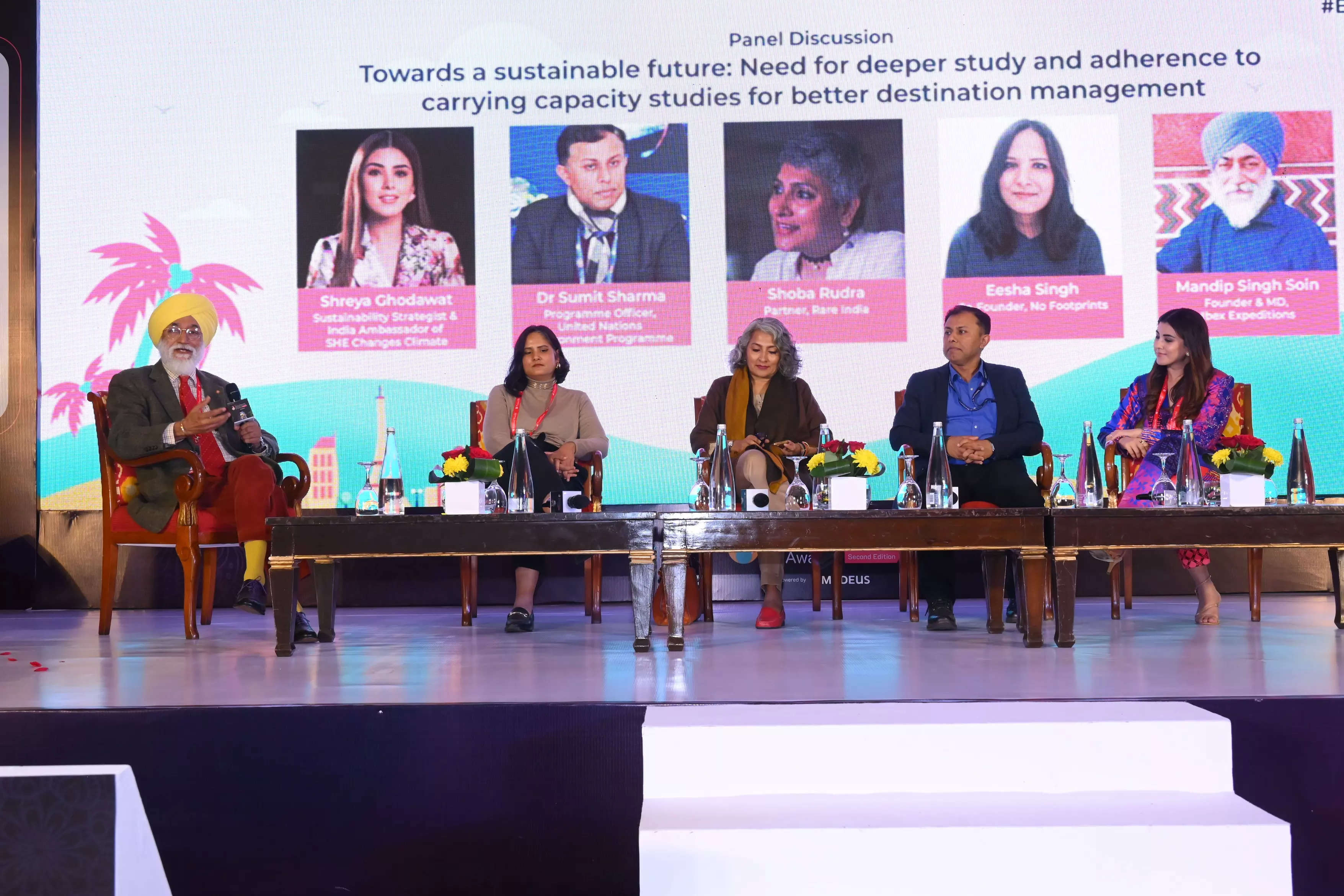
Amidst the soaring global travel trends and tourism growth facilitators discussed at the ET Travel & Tourism Conclave & Awards, a consortium of sustainability and responsible tourism experts gathered on a panel, carving out suggestions for a sustainable future of travel and tourism in India. Need for deeper study, embedding local and culture experiences, and taking up the responsible traveller guidelines while adhering to carrying capacity studies for better destination management were a few of the many discussion points that ignited a fiery call for immediate action in the tourism sector.Leading the charge was Mandip Singh Soin, the Founder & MD of Ibex Expeditions and founding President of RTSOI, a pioneer who has been upholding responsible tourism practices throughout his 43 years of experience in the sector. The core of tourism’s future lies in sustainability, he shared, setting the tone for the discussion.
Recognising the need for change within the tourism sector, Soin expressed that organisations like PATA have pioneered sustainability efforts, contrasting them with associations merely paying lip service to the cause.
Acknowledging the progress made in sustainable tourism in collaboration with the Ministry of Tourism and various state governments, Soin admitted there’s still considerable ground to cover.
“We have persistently advocated for this, and now, I’m hopeful that it will transition from mere documentation to practical implementation. Our plea was straightforward: before state governments receive funds from the Ministry of Tourism for state tourism development, we urged them to present a comprehensive tourism plan, encompassing carrying capacity assessments, as well as allocating specific funds for site studies. With cooperation from state governments, this initiative could potentially pave the way for a more sustainable future in various destinations,” he shared.
However, beyond these efforts lie a pressing need to address carrying capacity and the challenges of over tourism, shared Soin, adding that dipsticks on overloaded tourism destinations which have visibly faced challenges will play a major role. These efforts, he said, also underline the need for increased industry involvement in championing responsible tourism practices.
“It’s imperative to shift our mindset from prioritising customers above all else to prioritising the environment. Our policies and actions should align with this shift in focus,” he said, throwing open the dias to other panellists for their suggestions.
Transitioning from traditional city tours to immersive experiences
Soin’s rallying cry was echoed by Eesha Singh, Co-Founder of No Footprints, who advocated for a radical shift in the traditional narrative of city tours. “Conventional city tours lack cohesive narrative and have long been about cramming monuments into itineraries without meaningful connections,” Singh asserted, urging for a paradigm shift towards immersive experiences rooted in local narratives.
“The problem isn’t just about over tourism; it’s about neglecting the essence of travel, missing out on diverse elements that truly matter,” Eesha stressed. She advocated for including other facets, focusing not just on the right way to travel but also on the enjoyment and depth of experiences. She expressed concern that without measuring the involvement of local communities, engaging with them or highlighting destinations positively, there’d be minimal incentive for a shift from the monotonous monument-centric tours.
“If our key performance indicators also fail to prioritise aspects like carrying capacity, local community involvement, and portraying destinations positively, there’s minimal motivation for ground-level change. We’ll persist in the same conventional tourism patterns, focusing solely on financial gains. However, our destinations offer much more potential beyond the current norm. Take our ‘Mumbai by Dawn’ tour as an example—it began as a deeply cultural exploration, showcasing communities rivalling iconic monuments like the Taj Mahal,” she said.
She further pointed out a rise in conscious consumerism, indicating a growing appreciation for destination knowledge.“Let’s offer travellers context—details about what locals prefer and what defines the essence of a destination,” Singh urged.
Industry must think beyond trends, prioritise sustainability & go back to neglected spots
Painting a picture of the Indian tourism industry’s struggle with sustainability, innovation, and the impact on destinations, Shoba Rudra, Partner at Rare India articulated her concerns about the industry’s cycle of creation and depletion of destinations, highlighting the need for a conscious shift in approach.
“As an industry, we’re an unaware audience,” she reflected. She emphasised the industry’s tendency to replicate successful ventures without fostering fresh ideas, ultimately saturating markets, and neglecting sustainability. Rudra underscored the critical need for a broader perspective on innovation and awareness, urging the industry to think beyond superficial trends and prioritise sustainable practices.
She challenged the industry’s status quo, questioning the audience’s awareness and decision-making. “Are we truly conscious of our actions?” Rudra queried. “The industry’s inability to self-regulate is leading to the ruination of one destination after another,” she expressed.
“We’re transforming pristine destinations into overwhelmed hotspots,” Rudra lamented. “Places like Ladakh, once untouched, have succumbed to overdevelopment. The relentless pursuit of growth without considering carrying capacities threatens these beautiful locales.”
She delved deeper, citing the plight of once-thriving destinations now struggling due to unsustainable tourism practices. “Pushkar, once a gem, now suffers due to haphazard development and neglect,” she mentioned.
Rudra further stressed the need for a paradigm shift, urging stakeholders to reassess their role in preserving destinations. “We must redirect our efforts, reviving these neglected spots rather than continuously seeking new destinations to exploit.”
Inclusive approach for regenerative tourism needed
Also speaking on the panel, Shreya Ghodawat, a Sustainability Strategist and India Ambassador of SHE Changes Climate, highlighted the imperative need for a comprehensive approach to sustainable tourism. She emphasised the concept of ‘degrowth’ in the context of tourism, advocating a balance between economic expansion and ecological limitations.
“We’re witnessing the consequences of unsustainable growth on a finite planet,” Ghodawat stated, stressing the need for regenerative tourism practices, which allows tourist destinations time to recover after visitation.
“This is crucial since over-tourism to these places impedes this healing process,” she added, saying that this concept jeopardises the very destinations we aim to cherish.
Ghodawat also underscored the role of social media in influencing travel choices and behaviours. “Media narratives shape our travel decisions. Promoting sustainable practices like carrying reusable bottles or endorsing slow, conscious travel through these platforms is vital,” she asserted.
Further highlighting the necessity for inclusive decision-making, Ghodawat urged for diverse representation in policy formulation. “All stakeholders—be it academics, policymakers, travellers, media—must contribute. Inclusive policies should reflect on-ground realities, including studies on carrying capacity and tourists’ impact,” she emphasised.
Developing indicators for carrying capacity studies with pvt sector collab crucial
Drawing attention to the impact on tourism destinations, Dr Sumit Sharma, Programme Officer at the United Nations Environment Programme (UNEP) started by citing instances where environmental degradation and climatic change has led to halted events like cricket matches due to poor air quality. Here, said Sharma, the concept of carrying capacity becomes crucial-not just for local communities but also for the sustainability of a particular destination.
“It’s imperative to protect the essence and beauty of these tourist spots, ensuring that their sustainability never reaches a tipping point,” Sharma emphasised. He urged for a strategic collaboration between the private sector and environmental organisations to develop and adhere to robust indicators that define and maintain a destination’s carrying capacity.
He also pinned up the critical need for immediate action to address the deteriorating condition of India’s rivers and marine environments. Speaking on the panel, Sharma highlighted the alarming reality of water quality in the country’s rivers, noting that over 60 per cent fail to meet national standards and lag considerably behind WHO standards.
“Most of our rivers fall within the lower categories when it comes to water quality, signifying a grave concern for the health of these vital resources.”
Sharma also encouraged industry members to engage with the Global Tourism Plastics Initiative initiated by UNEP, which offers strategies not only for preserving monuments, keeping them away from plastic waste and carrying capacity but also for reducing operational costs.




